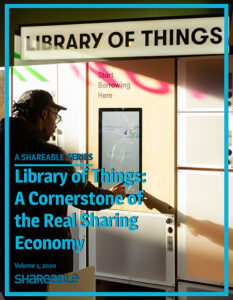When Punsri Abeywickrema created his online rental marketplace for travelers, he imagined able-bodied people lugging bulky items like camping gear, strollers, cameras and sports equipment. He didn’t realize his biggest market would be in mobility aids, catering to one of the fastest-growing segments of the population.
Abeywickrema’s company Cloud of Goods launched in 2016 to deliver rental equipment to vacation destinations. It turns out that transporting mobility devices is not only complicated and expensive but it can also be impossible. It’s free to check a wheelchair with airlines but they are sometimes damaged in the process. Most airlines refuse to accept electronic mobility devices because they have lithium batteries.
“When we launched Cloud of Goods, we didn’t think wheelchairs and electric scooters would be our primary vertical but we found this is the main problem we are solving, and we are growing quickly in this niche because of that,” Abeywickrema said.
As the last of the Baby Boomers hit retirement age, we are seeing an unprecedented swell in the aging population. The share of households with mobility devices has grown from about six percent in 1990 to eight percent in 2010. By 2025, 13 percent of households are expected to have at least one.
Cloud of Goods is giving people with a disability more mobility while traveling, and even the chance to explore places they didn’t think possible.
Robin Oglesby-Harris and her best friend wanted to take their mothers from Phoenix to Vegas to celebrate the new year. The pair used Cloud of Goods to rent scooters to help their mothers, 75 and 80, traverse the strip.
“We went up and down that strip and the battery still had life when we got back to our room!” Ogelsby-Harris said.
Customers reserve equipment from Cloud for Goods on an online portal and have it delivered to their hotel, airport, or other destination. Gear starts at $6 a day.
Abeywickrema said a big chunk of business came via travel agents and concierges but others were parents who do not want to transport cumbersome baby gear and campers who want to “try before they buy” all the equipment for a new experience.
Creating the world’s largest pool of shared household goods
This is not Abeywickrema’s first sharing business. In 2008, while borrowing a wheelbarrow from a neighbor, he hit on the idea of a peer-to-peer rental service for household goods. His system allows him to control the supply and cater to consumer needs, which he calls the “access economy.” He is currently working on a model to create the world’s largest pool of shared household goods.
“I believe the Sharing Economy 2.0 is really the underlying need for access, and we are using modern technology to make this easier for people,” he said.
“We get a lot of messages over the holiday season from people who want to rent kitchen equipment and items for large parties, so we are looking into filling that need,” he says.
Cloud of Goods operates in San Francisco, Orlando, Anaheim, Las Vegas, Los Angeles, San Diego, New York City, and New Orleans with pilots in Atlanta and Washington, DC. The company has just passed 50,000 transactions and plans to expand globally in 2020.
##
 |
This post is part of our 2020 editorial series on libraries of things. Download the free ebook from the series here. |









